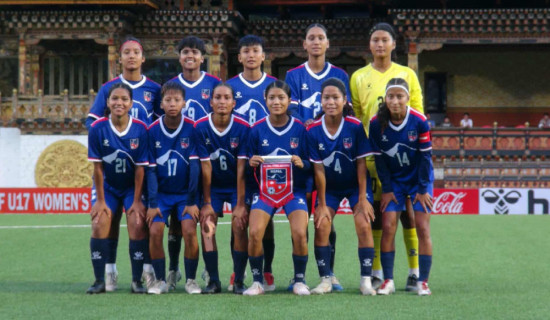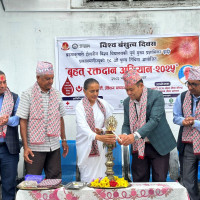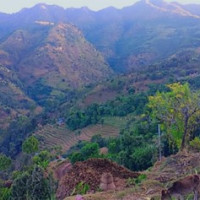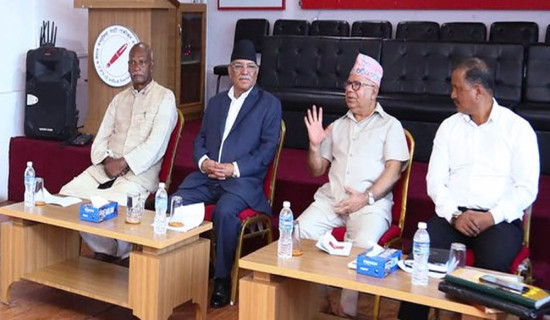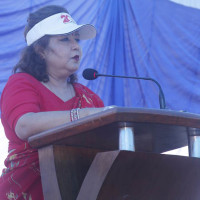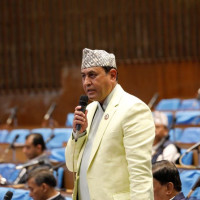- Saturday, 23 August 2025
PM Oli inaugurates Rani Jamara Irrigation Project
By Ekindra Timilsena,Tikapur, July 30: Prime Minister KP Sharma Oli on Tuesday inaugurated the extended irrigation facilities, hydropower, and transmission line of the Rani Jamara Kulariya Irrigation Project.
Prime Minister Oli inaugurated the irrigation facilities covering an additional 14,300 hectares of land, along with a 4.71-megawatt hydropower plant and the associated transmission line.
“It is a matter of happiness for all Nepalis that the second extension this Rani Jamara Kulariya Irrigation Project,” the Prime Minister said after inaugurating
the project.
Electricity has been generated from the irrigation canal at Katase, Janaki Rural Municipality, Kailali, and connected to a 33 kV transmission line.
The Rani Jamara Kulariya Irrigation Project, a national pride project, has completed its second phase and is now entering its third phase.
Previously providing services in Tikapur, Lamkichuha, and Janaki Rural Municipalities, the project will now expand irrigation and increase agricultural production in Bhajani, Joshipur, Bardagoriya, Ghodaghodi, and other municipalities under its third phase.
Prime Minister Oli described the project as a historic achievement in the development of Nepal’s water resources and rural agriculture.
It reflects the transformation of Nepal’s rural lifestyle, agricultural production, energy self-reliance, and food security, he added.
He highlighted that the Rani Jamara Kulariya system, which began 120 years ago as a collective effort of local farmers using traditional methods, has now been modernised.
He credited local participation and government coordination for laying the foundation for today’s success.
Prime Minister Oli also instructed the concerned authorities to expedite other national pride irrigation projects such as Sikta, Babai, Mahakali III, Bheri–Babai, and Sunkoshi–Marin Multi-purpose Project.
However, he said that the construction of the Sunkoshi–Marin Irrigation Project that will irrigate 122,000 hectares of was delayed while despite making the breakthrough in its tunnel, Bheri-Babai project was delayed due to its contractor.
He warned that those who delayed in completing projects would not be spared.
Speaking at the event, Minister for Energy, Water Resources and Irrigation Deepak Khadka said, “Today, we are witnessing the results of creative labour, long-term planning, and
shared commitment.”
“The coordination between irrigation and energy has brought about noticeable changes in farmers’ living standards, establishing this project as a national pride project," said Minister Khadka.
The project, located in the Lamki area of Sudurpaschim Province, is expected to significantly contribute to agricultural self-sufficiency and
rural prosperity.
Minister Khadka clarified that the Rani Jamara Kulariya Project is not merely limited to constructing physical irrigation infrastructure, but it is being implemented with the vision of transforming the entire lifestyle of the farmers’ community.
He mentioned that the project has not only made the land green but also sowed hope in the hearts of farmers.
Citing the current water crisis in some areas of Madhes Province, he presented the example of farmers in the Rani Jamara area who have received reliable year-round irrigation services and are free from such problems.
He expressed his belief that such infrastructure would help maintain consistent agricultural production even amidst challenges such as unseasonal rainfall or drought caused by climate change.
Minister Khadka added that the government has started managing water resources scientifically and stressed the need for proper management of groundwater, lakes,
rivers, and streams.
Referring to water transfer projects such as Bheri–Babai and Sunkoshi–Marin, he emphasised that reservoir-based multi-purpose irrigation projects are the way forward.
In this context, he shared his recent experience from visiting the Mahakali Irrigation Project and expressed concern over the impact caused by the non-release of water from the Tanakpur Barrage.
He assured that the government is making diplomatic efforts on the issue and is prioritising large irrigation projects in Sudurpaschim Province.
Minister Khadka mentioned that the Rani Jamara Kulariya Irrigation System is a historical and social heritage of Nepal’s western Tarai region, originally constructed by local farmers using traditional canal systems nearly 120 years ago.
He added that the system has now been reconstructed and modernised.
Initiated in the fiscal year 2066/67 BS with the support of the World Bank as a multi-dimensional reform programme, the project has now completed its second phase and is moving towards the third phase.
He informed that the ministry is working on a modality for the utilisation of the 4.71 megawatts of electricity generated from the project and that an appropriate decision will be made by the government soon.
He also mentioned that there is a goal to expand irrigation over an additional 24,300 hectares, thereby providing service to a total of 38,300 hectares of land.
He emphasised the need for constructing necessary structures and adopting technology-based management.



